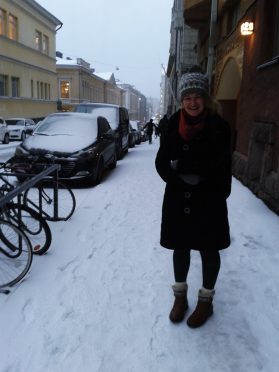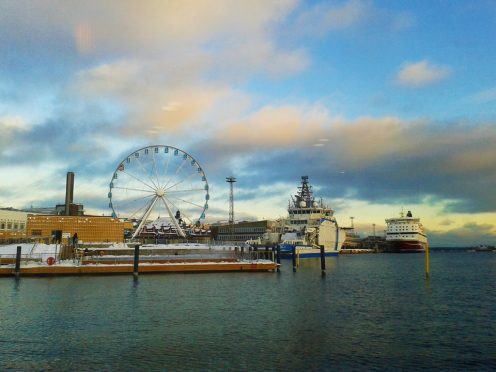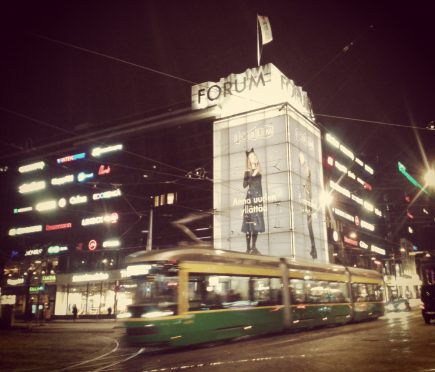Pre-Departure:
Prior to my departure to Helsinki, I did a lot of online research to get a good idea of where I was going to spend the following four months. I researched things like weather and how to prepare for it, people and what customs I should keep in mind, as well as general costs of living. In addition, the host university regularly sent us links to blog posts, which were quite helpful in addressing general concerns of exchange students. Especially when it came to packing wisely, the research helped me to take along the essentials, but not weigh myself down by things that were equally available in Finland. Thus, I did not take a big jacket or winter shoes, but only bought them in Helsinki, as the South African market would anyways not have equipped me for the Finnish winter climate. Although I do not know how my stay would have gone if I had not done this research, I felt well prepared when I made it to Helsinki.
In addition to gathering information, I also started to collect Euros before leaving. These I got from European visitors (via couchsurfing.org.) who stayed with me and who exchanged them for South African Rand. These euros helped me a lot when I got to Helsinki as I was able to buy the first train tickets from the airport, and covered all other costs that occurred before I was able to open a bank account. I am sure there are many other options than cash money, but having a bit of local currency for the start put me at ease.
Since I have both a Namibian and a German passport, I did not have to get a visa. However, this posed different problems once I was in Finland. When I wanted to open a bank account in Helsinki, the bank required a Finnish identity number. This, you would get with a visa. Other European exchange students were expected to use their European bank account, which I did not have. Luckily, the exchange services at the university were able to assist me with this complication and, even though it took me three weeks, I was able to open a temporary account eventually.
Lastly, a friend had borrowed me a Finnish textbook a few weeks before I left. Even though I had no idea of pronunciation, I made an effort to learn basics, like greetings (“Moi” or “Hei”), saying ‘Thank you’ (“Kiitos”) and counting up to ten. I knew that everyone, or most Finns can speak English quite well, and I definitely would have managed easily with no knowledge of Finnish. However, moving to a new country comes with so many new and strange impressions that things like recognizing a few written words, being able to respond to greetings, and to thank someone in the local language helps in making you feel at home. Plus, even though I was not able to maintain a conversation in Finnish, I noticed that Finns opened up much quicker if you added a few words in their mother tongue.
Experience at the Host University:

From the day of arriving at the University of Helsinki until the day that I had to leave, I felt perfectly at home. Although there were a few hick-ups and hour-long queues at the orientation program, our tutor was so helpful and welcoming that no one was bothered by the waiting. Despite some staff shortages, all the administrators of the university were friendly and took their time to answer individual questions of students. Additionally, our tutor organized several tours for us to acquaint us with the campus life, all the facilities – such as the amazing library – and all the different cafeterias that provide cheap and healthy meals for students. At the end of the week our tutor group went on a city tour, which got us very excited about the place where we were going to spend the next semester. Most importantly, it helped me to orientate myself in my new environment, so that afterwards I could do my daily trips from home to campus by foot without getting lost.

The lectures required some adjustment, coming from Stellenbosch. Instead of 50 minutes, Helsinki lectures are 2 hours in length. Although this sounds impossible to survive at first, the nature of the lectures makes it easier to concentrate for this length of time. The teaching is much more interactive than in Stellenbosch, and instead of a one-sided conversation, lecturers expect students to participate in a constant discussion of the content. Lecturers also expect students to call them by their first names, which reflects Finland’s non-hierarchical society. Lecturers are not viewed as more important than students, but instead, students are encouraged to question the lecturer’s proposals so as to enrich the academic discussion. Even though most of my evaluations were based on an exam at the end of the lecture series, this lecture style also meant that students had to come prepared. If a student had not read the suggested readings, this quickly became apparent (and possibly embarrassing) in the class discussions.

Apart from the different lecturing style, I felt that the academic standard was comparable to Stellenbosch, if not easier at times. Even though I generally did not have enough time to study, I passed all my courses with good marks. What I did struggle with though, was the lack of 24-hour learning facilities. Coming from Stellenbosch, I was used to learning facilities and IT-centres with 24/7 access via a student card. This is especially helpful during exam times, as it provides a learning environment that encourages little distractions. Unfortunately, Helsinki University did not have such facility apart from the library, which only opened at 8 in the morning and closed at 8 in the evening during the week. Over weekdays, it was only open for a few hours on Saturday. Hence, I had to change my work habits and tried to get used to studying at home. Even though it worked for the given time, I would have preferred a separate setting.
Return to Stellenbosch:
My return to Southern Africa came with mixed feelings that highlighted both the privileges that we can enjoy as well as the less enjoyable sides. For the first few days, I mainly enjoyed the sunshine and the long days. When I had left Finland, the sun rose at 09:30 and set at 15:30 in the afternoon. And with sunrise, I mean that the sun hovered over the horizon for a few hours before disappearing completely again. Although I did not feel depressed in any way, I realized how much I had missed the light and the long daylight hours, once the plane landed in Ethiopia (I flew over Addis Ababa) and I was exposed to the clear, hot rays again. Similarly, I am very grateful to have the option of going for hikes here in near-by reserves (e.g. Jonkershoek) again, where the possibility exists of not seeing another person for hours at a time. These moments of loneliness were one of the main things I started to miss in Europe. Even though Finland is one of the least populated countries in Europe, everywhere I went, I was surrounded by people. Only on my trip to Lapland did I encounter the vast spaces and landscapes that I am used to, especially from my home country, Namibia.
Some of the things I do miss now, are the excellent public transport and the safety. As in most European countries, transport in Helsinki was very frequent, reliable and safe. Now that I am back, I first had to get used to driving again, especially in the somewhat erratic traffic of Namibia and South Africa. Additionally, I rarely saw homeless people or beggars in Helsinki, which speaks for the country’s excellent welfare system. I experienced this change as a small shock when I returned, as you are confronted with poverty in any corner of Stellenbosch. As a by-product of this sad reality, I had to start engaging a part of my mind with safety concerns again. In Helsinki, I had gotten used to the freedom of walking around at any time of day (or night) without having to stress about my wellbeing or belongings. Naturally, this concern is a small price to pay, as it shows that I am one of the few who have something to lose, in contrast to the many people who do not worry about losing a phone, but rather about the next meal or a place to sleep. However, my experience in Helsinki showed me that poverty is not a necessary part of a city’s landscape, but that it is well possible to support every citizen in a developed economy.
In terms of future outlooks, my experience in Helsinki encouraged me to apply for Master’s courses in Europe. I realized that studying in a different country is enriching in more than just an academic sense. I encountered different ways of life and thinking that changed my perspective on how things can or should be done. By taking another overseas course, I know that this expansion of perspectives will benefit the way I will end up working in/for my country after my studies.

